#holocaust history
Text
On May Day, May 1, 1943, surviving fighters in the Warsaw Ghetto, most of whom were varying stripes of Socialist, sang The International. One of Jewish commanders, Marek Edelman, wrote about it in his memoir:
“On May Day, the Command decided to carry out a ‘holiday’ action. Several battle groups were sent out to ‘hunt down’ the greatest number of Germans possible. In the evening, a May Day roll-call was held. The partisans were briefly addressed by a few people and the ‘Internationale’ was sung. The entire world, we knew, was celebrating May Day on that day and everywhere forceful, meaningful words were being spoken. But never yet had the ‘Internationale’ been sung in conditions so different, so tragic, in a place where an entire nation had been and was still perishing. The words and the song echoed from the charred ruins and were, at that particular time, an indication that Socialist youth was still fighting in the Ghetto, and that even in the face of death they were not abandoning their ideals.”
He didn't include anything regarding the language they sang in, but Edelman was a member of the Bund, and they were staunch Yiddishists, so I'd like to think it sounded like this:
youtube
197 notes
·
View notes
Text
I hate Zone of Interest. I hate that telling stories about gadje is the only way you’re interested in hearing about our pain. I hate that you only want the Holocaust when it centers YOU.
you want a story about the horrors of trying to hold onto your family while knowing exactly what is going on behind that fence? Don’t watch a movie about the man in charge.
Let me tell the story of the Gypsy Family Camp. Of a year of pretending, desperately, like they will not do to your children what they are doing to your cousins. Of families kept together, clinging to prayers that what they know happens just on the other side of the fence- won’t happen to you. How you’ll twist yourself to play their games, think “at least I save myself”, and dehumanize your fellow victims. How you will cooperate, hoping that will prove yourself to them (because you are already so broken, because they have taken everything from you, taken the sky the ground the roads the water- now they take your empathy-). How that will not be enough. How that was never enough. How you fight to the end to hold your children. How you lose to disease and experiments and the gas chambers anyways. How you were always doomed to lose.
23,000 Roma, Sinti, Gypsies and Travellers at the Gyspsy Family Camp.
Yet the movie that wins awards is about their captor.
#Oscars#romani#holocaust#history#zone of interest#I am tired of Holocaust movies about Germans and Nazis#Holocaust history#romani history
6 notes
·
View notes
Link
#i think the littlegoythings blog doesn't exist anymore#i'm filling in#shoah#holocaust#holocaust history
34 notes
·
View notes
Text

I've been itching to re edit this photo for ages and finally got round to it ..
I took this one last year at the Platszow Concentration Camp in Krakow, famous for its association with Oskar Schindler. It is now a nature walk, but the atmosphere is very eerie, quiet and desolate. I saw a few people there, dog walkers and Mums with pushchairs, but that didn't make the place feel any less sinister. I actually felt more here than I did when I went to Auschwitz a few days earlier.
It's extremely surreal, walking beside a busy main road, through a Lidl Car park, alongside some Communist Era, Brutalist Blocks of Flats and a kids playpark and then walking into this wasteland that had once been part of the atrocious legacy of nazi genocide.
This disturbing memorial can be found near the Grey House, former home of the Camp Overseer Amon Goth.
#goth#gothic#gloomcore#my photography#original photographers#photographers on tumblr#horror aesthetic#dark ambient#krakow#poland#schindler's list#holocaust history#world war 2#concentration camp#memorial
2 notes
·
View notes
Text
In Ch 4 of Corrie ten Boom’s autobiography, The Hiding Place, she gives an account of a German apprentice at her family’s watch shop who had been a part of the Hitler Youth, which gives a peek of the indoctrination levels already in place by 1939.
—
And while Haarlem and the rest of Holland strolled and bowed and swept its steps, the neighbor on our east geared for war. We knew what was happening—there was no way to keep from knowing. Often in the evening, turning the dial on the radio, we would pick up a voice from Germany. The voice did not talk, or even shout. It screamed. Oddly, it was even-tempered Betsie who reacted most strongly, hurrying from her chair and flinging herself at the radio to shut off the sound.
And yet, in the interludes, we forgot. Or, when Willem was visiting and would not let us forget, or when letters to Jewish suppliers in Germany came back marked “Address Unknown,” we still managed to believe that it was primarily a German problem. “How long are they going to stand for it?” we said. “They won’t put up with that man for long.”
Only once did the changes taking place in Germany reach inside the little shop on the Barteljorisstraat, and that was in the person of a young German watchmaker. Germans frequently came to work under Father for a while, for his reputation reached even beyond Holland. So when this tall good-looking young man appeared with apprentice papers from a good firm in Berlin, Father hired him without hesitation. Otto told us proudly he belonged to the Hitler Youth. Indeed it was a puzzle to us why he had come to Holland, for he found nothing but fault with Dutch people and products. “The world will see what Germans can do,” he said often.
His first morning at work he came upstairs for coffee and Bible reading with the other employees; after that he sat alone down in the shop. When we asked him why, he said that though he had not understood the Dutch words, he had seen that Father was reading from the Old Testament which, he informed us, was the Jewish “Book of Lies.”
I was shocked, but Father was sorrowful. “He has been taught wrong,” he told us. “By watching us, seeing that we love this Book and are truthful people, he will realize his error.”
It was several weeks later that Betsie opened the door from the hallway and beckoned to Father and me. Upstairs on Tante Hand’s tall mahogany chair sat the lady who ran the rooming house where Otto lived. Changing the bedsheets that morning, she said, she had found something under his pillow. And she drew from her market satchel a knife with a curving ten-inch blade.
Again, Father put the best interpretation on it. “The boy is probably only frightened, alone in a strange country. He probably bought it to protect himself.”
It was true enough that Otto was alone. He spoke no Dutch, nor made any effort to learn, and besides Father, Betsie, and me, few people in this working-class part of the city spoke German. We repeated our invitation to join us upstairs in the evenings, but whether he did not care for our choice of radio programs, or because the evening ended as the morning began, with prayer and Bible reading, he seldom did.
In the end, Father did fire Otto—the first employe he had ever discharged in more than sixty years in business [sic]. And it was not the knife or the anti-Semitism that finally brought it about, but Otto’s treatment of the old clock mender, Christoffels.
From the very first I had been baffled by his brusqueness with the old man. It wasn’t anything he did—not in our presence anyway—but what he didn’t do. No standing back to let the older man go first, no helping on with a coat, no picking up a dropped tool. It was hard to pin down. One Sunday when Father, Betsie, and I were having dinner at Hilversum I commented on what I thought was simple thoughtlessness.
Willem shook his head. “It’s very deliberate,” he said. “It is because Christoffels is old. The old have no value to the State. They’re also harder to train in the new way of thinking. Germany is systematically teaching disrespect for old age.”
We stared at him, trying to grasp such a concept. “Surely you are mistaken, Willem!” Father said. “Otto is extremely courteous to me—unusually so. And I’m a good deal older than Christoffels.”
“You’re different. You’re the boss. That’s another part of the system: respect for authority. It’s the old and the weak who are to be eliminated.”
We rode the train home in stunned silence—and we started watching Otto more closely. But how could we know, how in Holland of 1939 could we have guessed, that it was not in the shop where we could observe him but in the streets and alleys outside that Otto was subjecting Christoffels to a very real, small persecution. “Accidental” collisions and trippings, a shove, a heel ground into a toe, were making the old clockman’s journeys to and from work times of terror.
The erect and shabby little man was too proud to report any of this to us. It was not until the icy February morning that Christoffels stumbled into the dining room with a bleeding cheek and a torn coat that the truth came out. Even then, Christoffels said nothing. But running down to the street to pick up his hat, I encountered Otto surrounded by an indignant little cluster of people who had seen what happened. Rounding the corner into the alley, the young man had deliberately forced the older one into the side of the building and ground his face against the rough bricks.
Father tried to reason with Otto as he let him go, to show him why such behavior was wrong. Otto did not answer. In silence he collected the few tools he had brought with him and in silence left the shop. It was only at the door that he turned to look at us, a look of the most utter contempt I had ever seen.
2 notes
·
View notes
Text

This was such a raw and honest and horrific story, a true story. Very short, easy to read, the very fact that it's those two things only adding to the horror of this autobiography. Even as someone who has done a fair amount of Holocaust reading, it still takes on an otherworldly feel. I know these stories. I'm familiar with the horrors inflicted on these people, but there's still this part of me that just can't fathom enduring this level of slow torture.
From a literary perspective, the writing was brilliant. It was not cluttered with any frills, but still had lines that stopped me dead with their saddnes, their betrayal, their expression of humanity in both its gentleness and absolute barbaric-ness.
I highly recommend this book be read, both by those who study the Holocaust, and those who don't. Probably should be required reading.
#feed the muse#reading#books#book review#ww2 history#wwii#Holocaust history#Holocaust#real horror#night#elie wiesel
8 notes
·
View notes
Text
LGBTQ Institute in Germany Was Burned Down by Nazis | Teen Vogue
"LGBTQ Institute in Germany Was Burned Down by Nazis | Teen Vogue" https://www.teenvogue.com/story/lgbtq-institute-in-germany-was-burned-down-by-nazis/amp
I knew the Nazis burned queer theory in the infamous "Nazi book burning," but what I did not know is that they did it literally on my birthday 59 years before I was born.
Anyway, this is an important bit of queer history that is rarely taught in schools (or, really, anywhere). Please do yourselves a favor and learn a little about the Institute of Sexology, Dr. Hirschfield, and the booming drag scene in Germany during the 1930s.
#queer history#lgbt history#important#queer#transgender#gender#psa#nazi book burnings#holocaust history
6 notes
·
View notes
Note
Rowling isn't denying holocaust. She just pointed out that burning of transgender health books is a lie as that form of cosmetic surgery didn't exist. But of course you knew that already, didn't you?
I was thinking I'd probably see one of you! You're wrong :) Let's review the history a bit, shall we?
In this case, what we're talking about is the Institut für Sexualwissenschaft, or in English, The Institute of Sexology. This Institute was founded and headed by a gay Jewish sexologist named Magnus Hirschfeld. It was founded in July of 1919 as the first sexology research clinic in the world, and was run as a private, non-profit clinic. Hirschfeld and the researchers who worked there would give out consultations, medical advice, and even treatments for free to their poorer clientele, as well as give thousands of lectures and build a unique library full of books on gender, sexuality, and eroticism. Of course, being a gay man, Hirschfeld focused a lot on the gay community and proving that homosexuality was natural and could not be "cured".
Hirschfeld was unique in his time because he believed that nobody's gender was either one or the other. Rather, he contended that everyone is a mixture of both male and female, with every individual having their own unique mix of traits.
This leads into the Institute's work with transgender patients. Hirschfeld was actually the one to coin the term "transsexual" in 1923, though this word didn't become popular phrasing until 30 years later when Harry Benjamin began expanding his research (I'll just be shortening it to trans for this brief overview.) For the Institute, their revolutionary work with gay men eventually began to attract other members of the LGBTA+, including of course trans people.
Contrary to what Anon says, sex reassignment surgery was first tested in 1912. It'd already being used on humans throughout Europe during the 1920's by the time a doctor at the Institute named Ludwig Levy-Lenz began performing it on patients in 1931. Hirschfeld was at first opposed, but he came around quickly because it lowered the rate of suicide among their trans patients. Not only was reassignment performed at the Institute, but both facial feminization and facial masculization surgery were also done.
The Institute employed some of these patients, gave them therapy to help with other issues, even gave some of the mentioned surgeries for free to this who could not afford it! They spoke out on their behalf to the public, even getting Berlin police to help them create "transvestite passes" to allow people to dress however they wanted without the threat of being arrested. They worked together to fight the law, including trying to strike down Paragraph 175, which made it illegal to be homosexual. The picture below is from their holiday party, Magnus Hirschfeld being the gentleman on the right with the fabulous mustache. Many of the other people in this photo are transgender.
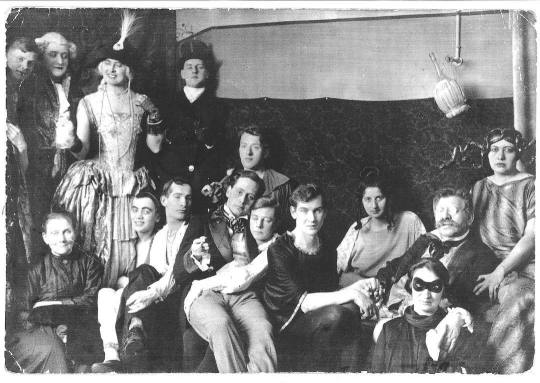
[Image ID: A black and white photo of a group of people. Some are smiling at the camera, others have serious expressions. Either way, they all seem to be happy. On the right side, an older gentleman in glasses- Magnus Hirschfeld- is sitting. He has short hair and a bushy mustache. He is resting one hand on the shoulder of the person in front of him. His other hand is being held by a person to his left. Another person to his right is holding his shoulder.]
There was always push back against the Institute, especially from conservatives who saw all of this as a bad thing. But conservatism can't stop progress without destroying it. They weren't willing to go that far for a good while. It all ended in March of 1933, when a new Chancellor was elected. The Nazis did not like homosexuals for several reasons. Chief among them, we break the boundaries of "normal" society. Shortly after the election, on May 6th, the book burnings began. The Jewish, gay, and obviously liberal Magnus Hirschfeld and his library of boundary-breaking literature was one of the very first targets. Thankfully, Hirschfeld was spared by virtue of being in Paris at the time (he would die in 1935, before the Nazis were able to invade France). His library wasn't so lucky.
This famous picture of the book burnings was taken after the Institute of Sexology had been raided. That's their books. Literature on so much about sexuality, eroticism, and gender, yes including their new work on trans people. This is the trans community's Alexandria. We're incredibly lucky that enough of it survived for Harry Benjamin and everyone who came after him was able to build on the Institute's work.
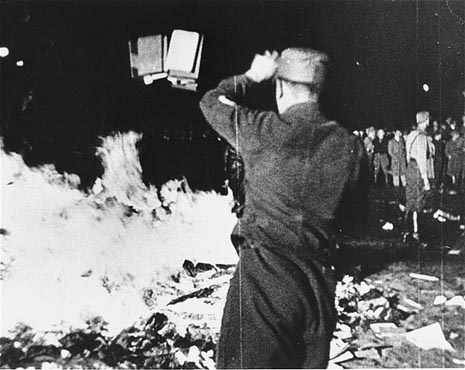
[Image ID: A black and white photo of the May Nazi book burning of the Institute of Sexology's library. A soldier, back facing the camera, is throwing a stack of books into the fire. In the background of the right side, a crowd is watching.]
As the Holocaust went on, the homosexuals of Germany became a targeted group. This did include transgender people, no matter what you say. To deny this reality is Holocaust denial. JK Rowling and everyone else who tries to pretend like this isn't reality is participating in that evil. You're agreeing with the Nazis.
But of course, you knew that already, didn't you?
Edit: Added image IDs. I apologize to those using screen readers for forgetting them. Please reblog this version instead.
#transgender#trans history#transsexual#transphobia#Magnus Hirschfeld#holocaust#holocaust denial#book burning#j.k. rowling#jk rowling#just in case you missed what i mean by all this: go fuck yourself anon :)#trans people have always existed#and we will always exist#if you really wanna pick a fight with me over well-documented history then you better bring in some sources to back your shit#queer history#queer#lgbt+#lgbta+#lgbt#lgbt history#edit: i finally got around to those damn image IDs. i am so very sorry for totally forgetting that's my bimbo moment of the month#also real quick i thought about adding an image of the actual building but the only one i can find has a Nazi parade in front of it#it was taken the day of the book burning raid and honestly if i were to include it then i'd add it to the first few paragraphs#and i think the story's better told when you uphold the hope Magnus Hirschfeld and all the researchers he worked with had#also keeps being brought up: yes Hirschfeld was a eugenicist. it was a popular belief set that was only discredited after WW2#Hirschfeld died in 1935. he literally didn't live long enough to see science turn against those beliefs and practices#considering how he changed his mind on transitions i like to think he would've changed his mind on eugenics too if he'd lived
16K notes
·
View notes
Text
WA May Pass Bill to Increase Holocaust and Genocide Awareness in Schools
April may become designated as International Holocaust and Genocide Prevention and Awareness Month within the state of Washington, courtesy of the efforts of several members of the Washington State Legislature.
Read more about the bill.
0 notes
Text
Some thoughts on learning the Holocaust.
There is no scale of suffering, or trauma, or hell. Someone who survived Treblinka and someone who survived Bergen Belsen both went through hell, just different versions of it. Holocaust survivors all experienced variations of hell, from Denmark to Minsk.
But when LEARNING about the Holocaust, it’s extremely normal to learn about it at levels, starting with the least horrifying; which is why, I think, Anne Frank’s narrative has become such a universalized understanding of the Holocaust.
But then you move to transit camps, to internment camps, the ghettos, to Auschwitz, to the Operation Reinhard Death Camps (Belzec, Sobibor, and Treblinka), to the Einsatzgruppen and Babi Yar Level Shit. And every new level makes the old one look less horrifying by comparison.
In that pattern of learning, it’s perfectly rational to say things like OH PLEASE BELSEN WAS NOTHING because you are a student absorbing traumatic history in the healthiest possible way. Saying something like that, as a student of history, is not a judgement on the experiences of survivors; it’s a commentary on sequential learning.
Historiographically speaking, Holocaust survivors and Holocaust historians often mutually fail to understand each other; to the point where survivors actively dislike historians (although soon this sentence will be entirely in past tense, unfortunately). And I’m pretty sure that, for historians of things that happened within living memory, this is an ongoing concern—language of experience and survival vs. language of learning and understanding. I’m not sure where I’m going with this, but I wish we had better language for this chasm.
116 notes
·
View notes
Text

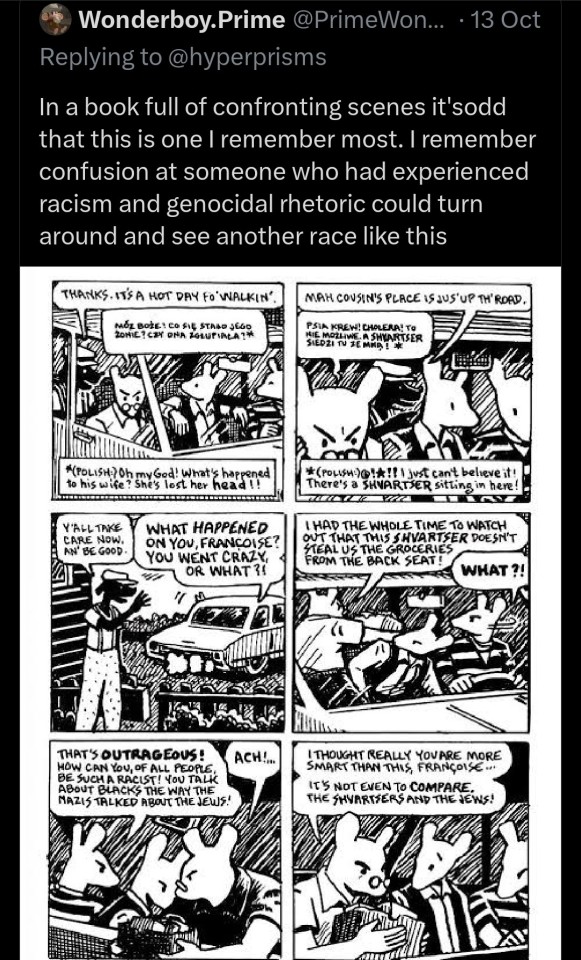
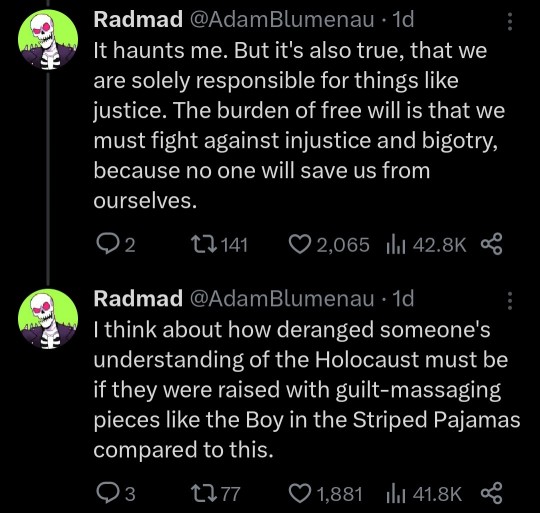




18K notes
·
View notes
Text
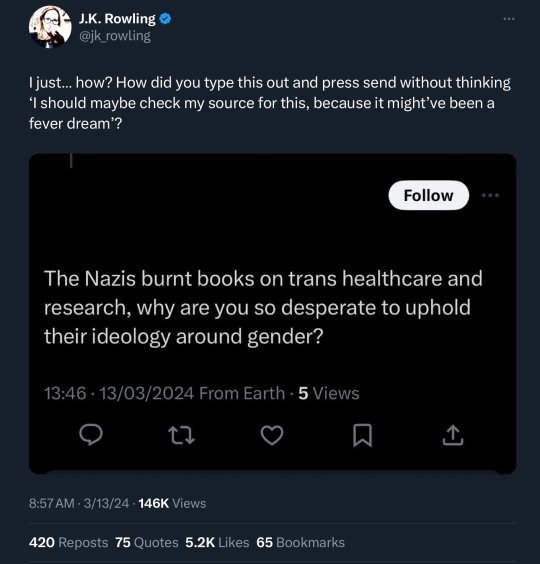
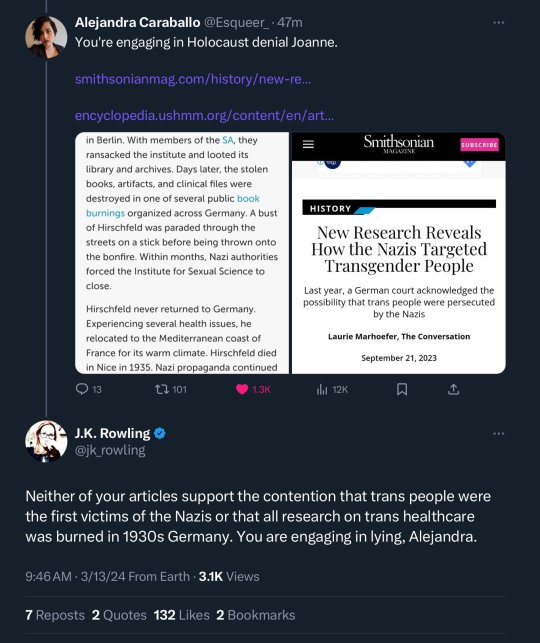
JK Rowling is in full Holocaust denial now.
Harry Potter fans, here is your favorite author doing Holocaust denial that I've only ever heard from the most farthest of far right idealogues. She's been posting about this continually after being presented with documentation of repression and murder.

There is evidence that it happened.

The source of the article
The Nazis targeted and burnt valuable trans research. This is fact. It’s concerning how far she’s falling down the extreme anti-trans rabbit hole & denying reality. She encourages disinformation that’s harming trans people.
“In the midst of the burning, Joseph Goebbels gave a political speech to a crowd of around 40,000 people”
They literally had a political rally in the middle of burning the institutes library. The fact that Rowling would try to deny this is really sick.
But at this point I'm not surprised about anything this vile woman says. She surrounds herself around with Neo-Nazis and her beliefs has led to actual deaths of Trans people.
Let me be perfectly clear. If you are denying the Holocaust in any shape or form, you are a fucking Nazi. JK Rowling is a fucking Nazi.

Update. George Takei came for her ass

2K notes
·
View notes
Text
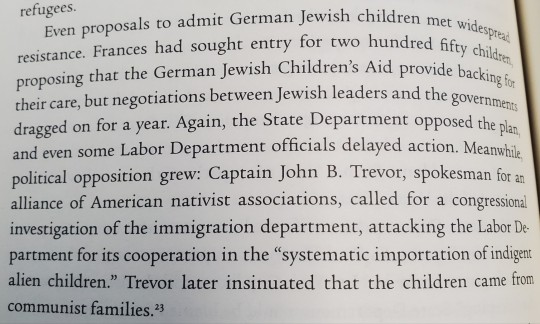

#the woman behind the new deal#frances perkins#kristin downey#real life#holocaust history#conservatives are morally bankrupt#jewish history
0 notes
Text
Corrie ten Boom’s autobiography, The Hiding Place, provides a peek into how Holland viewed Germany in 1937.
—
And still Wilem was not here. I said goodbye to some guests at the door and stood for a moment gazing up and down the Barteljorisstraat. Although it was only 4:00 in the afternoon the lights in the shops were coming on against the January dusk. I still had a great deal of little-sister worship for this big brother, five years older than I, an ordained minister and the only ten Boom who had ever been to college. Wilem saw things, I felt. He knew what was going on in the world.
Oftentimes, indeed, I wished that Wilem did not see quite so well, for much what he saw was frightening. A full ten years ago, way back in 1927, Wilem had written in his doctoral thesis, done in Germany, that a terrible evil was taking root in that land. Right at the university, he said, seeds were being planted of a contempt for human life such as the world had never seen. The few who had read his paper had laughed.
Now of course, well, people weren’t laughing about Germany. Most of the world’s good clocks came from there, and recently several firms with whom we had dealt for years were simply and mysteriously “out of business.” Wilem believed it was part of a deliberate and large-scale move against Jews; every one of the closed businesses was Jewish. As the head of the Dutch Reformed Church’s program to reach Jews, Wilem kept in touch with these things.
Dear Wilem, I thought, as I stepped back inside and closed the door, he was about as good a salesman of the church as Father was of watches. If he’d converted a single Jew in twenty years I hadn’t heard about it. Wilem didn’t try to change people, just to serve them. He had scrimped and saved enough money to build a home for re elderly Jews in Hilversum—for the elderly of all faiths, in fact, for Wilem was against any system of segregation. But in the last few months the home had been deluged with younger arrivals—all Jews and all from Germany. Wilem and his family had given up their own living quarters and were sleeping in a corridor. And still the frightened, homeless people kept coming, and with them tales of a mounting madness.
I went up to the kitchen where Nollie had just brewed a fresh pot of coffee, picked it up, and continued with it upstairs to Tante Jans’s rooms. “What does he want?” I asked a group of men gathered around the cake table as I set down the pot. “This man in Germany, does he want war?” I knew it was poor talk for a party, but somehow thoughts of Wilem always set my mind on hard subjects.
A chill of silence fell over the table and spread swiftly around the room.
“What does it matter?” a voice broke into it. “Let the big countries fight it out. It won’t affect us.”
“That’s right!” from a watch salesman. “The Germans let us alone in the Great War. It’s to their advantage to keep us neutral.”
“Easy for you to talk,” cried a man from whom we bought clock parts. “Your stock comes from Switzerland. What about us? What do I do if Germany goes to war? A war could put me out of business!”
And at that moment Wilem entered the room. Behind him came Tine, his wife, and their four children. But every eye in the room had settled on the figure whose arm Wilem held in his. It was a Jew in his early thirties in the typical broad-brimmed black hat and long black coat. What glued every eye to this man was his face. It had been burned. In front of his right ear dangled a gray and frizzled ringlet, like the hair of a very old man. The rest of his beard was gone, leaving only a raw and gaping wound.
“This is Herr Gutlieber,” Wilem announced in German. “He just arrived in Hilversum this morning. Herr Gutlieber, my father.”
“He got out of Germany on a milk truck,” Wilem told us rapidly in Dutch. “They stopped him on a streetcorner—teen-aged boys in Munich—set fire to his beard.”
Father had risen from his chair and was eagerly shaking the newcomer’s hand. I brought him a cup of coffee and a plate of Nollie’s cookies. How grateful I was now for Father’s insistence that his children speak German and English almost as soon as Dutch.
Herr Gutlieber sat down stiffly on the edge of a chair and fixed his eyes on the cup in his lap. I pulled up a chair beside him and talked some nonsense about the unusual January weather. And around us conversation began again, a hum of party talk rising and falling.
“Hoodlums!” I heard the watch salesman say. “Young hoodlums! It’s the same in every country. The police’ll catch up with ‘em—you’ll see, Germany’s a civilized country.”
0 notes
Text
27th January marks Holocaust Remembrance Day. When we think of the millions of lives taken by the Nazi regime. A regime that spurred a systemic white supremacist, ethnonationalist manifesto. A sepratist ideology of a supreme ethnicity, a supreme race, that had been festering across Europe for centuries. Millions of sacred lives, Jewish lives, taken in the name of supremacy. Of hatred and violence.
Millions of Jewish people, Soviet and Polish Citizens, communists, Rromani people, disabled people, Soviet prisoners of War and Queer people were murdered during the Nazi regime. Millions of lives were brutally taken whilst the Nazi regime convinced Germany, through a copious force of propaganda, that those lives were the real threat. That it were those lives who were inhumanely violent, were not just, they were deemed a threat to Nazi society.
Hitler and the Nazis promoted the idea of a master race— an Aryan, German race that needed to be protected as they thought that was the product of “racial purity”. And to Nazism, the Jewish people were the biggest threat to their sepratist, extremist ideology of racial purity. Initially, the Nazi leadership tried to force Jews out of Germany completely, with propaganda encouraging the dehumanisation of Jews to facilitate exile and the subsequent Holocaust of Jewish people in Europe.
“Rats, lice, cockroaches, foxes, vultures – these are just some of the animals the Nazis used to deride and dehumanize Jews. They used words too. In a new linguistic analysis of dozens of Nazi speeches, articles, pamphlets and posters, researchers show how this process of anti-Semetic dehumanization, which began before the Nazis took power and helped fuel the party’s popularity, was modulated to justify atrocity: in the years before the Holocaust.”
These lives, for purely existing, posed as a threat to the Nazis violently sepratist ideology. Propaganda subjugated German citizens with the power of deception; indoctrinating a people with the belief of superiority, purity and organic virtue. Simplifying the regimes ideological complexities to be palatable, unquestionable and targeting individualism. The ideological sepratism had indoctrinated millions into following the belief that Jewish people were sub-human— an undoubted threat to German people, values and society— and this was only achievable through the already pre-established rampant antisemitism that festered through out Medieval Europe, from Christian accusations of “killing Jesus”, to blood libel, the accusation of poisoned wells, and forcing Jews to chose either baptism or death.
“The mood changed markedly in around the year 1100, at the time of the First Crusade. Hordes of religious fanatics from all social classes, driven by a longing for redemption, set forth to kill infidels in the Middle East and to liberate holy Jerusalem. It stood to reason that they should also combat perceived enemies of Christ at home. Jews were hounded and forced to choose between baptism or death.”
The Holocaust happened because for generations, Europe failed to crack down on antisemitism. Christianisation spread through colonialism and with it, they carried antisemitism to new lands. The Holocaust happened because the Nazi party could convince millions of people of racial supremacy and purity. Far-Right ideology holds onto sepratist endorsement when they enforce anti-immigration laws, Islamophobic policies in France and the desperation of English nationalism. The Holocaust happened because Western superpowers only saw the Nazi imperial expansion as a threat to the Western hegemony.
The Holocaust of millions of Jewish people happened, and the effects of which are felt to this day. Every single day. The pain is carried through generations, for now there is a hole in every Jewish soul. We still feel the anguish, the pain. The frustration that this feels so never-ending.
And it is that pain, that fear, that drives us to say that with every last fighting breath, like the Maccabees who faught for our liberation, like King David who defeated a giant with a slingshot and stone and unbridled courage — Never again, for anybody. We will fight with all that we have. For such a magnitude of slaughter and pain should never touch this Earth for as long as we stand. We cannot carry forth our pain like a baton, we must hold it, a sword, to the enemy and ensure liberation of all feet that touch this Earth. They will not make our people, the Jewish people, into a proxy for their imperial expansion and sepratist Western values.
Never again, for anybody, for all life is sacred.
Never again, for anybody, and certainly not in our name.
Never again, for anybody, and that means Palestine.
#holocaust#history#statement#free palestine#palestine#anti capitalism#anti imperialism#jumblr#judaism#jewish thought#jewish#jewish socialism#jewish communists#anti zionist jews for palestine#anti zionism
2K notes
·
View notes